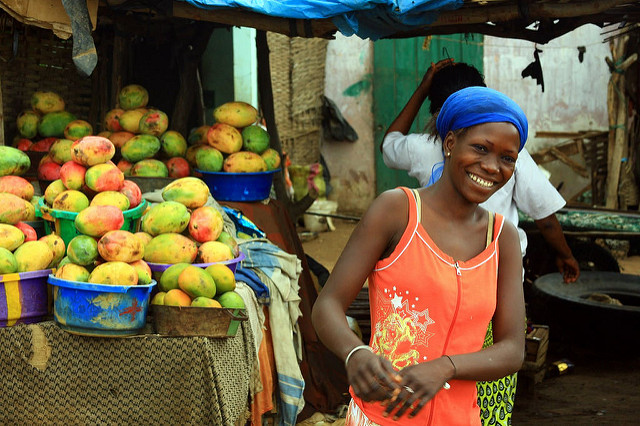Since 2014, IFPRI’s Markets, Trade and Institutions Division has partnered with FONGS, a federation of farmers’ associations in Senegal, and GRET, an international NGO, to test a pilot program that provides smallholder farmers with cash transfers and assistance in preparing farm management plans. Toward the end of the project, FONGS led a series of workshops and village-level meetings in which partners shared results (PDF), developed a deeper understanding of how the project affected local households, and discussed lessons learned with stakeholders at several different levels. The process capitalized on FONGS’ skills, experience, and networks to enable a deeper understanding of the project’s quantitative and qualitative results and to strengthen the project’s impacts on both policy and future interventions.
The process began with three four-day workshops, covering each of the project’s three geographical zones. Each workshop grouped together representatives from IFPRI, FONGS, and GRET, as well as leaders and project facilitators (“animateurs”) from implementing farmers’ associations and some household heads from each of the project’s treatment groups. These workshops provided a platform for partners to discuss results with project implementers and beneficiaries and also prepared animateurs to conduct village-level meetings in each of the 120 project villages.
A pair of animateurs then visited each village to facilitate a meeting with both beneficiary and non-beneficiary households. Animateurs shared the key project results discussed during the initial workshops with meeting attendees, and beneficiary households shared their perceptions of project services. This allowed the project implementers to gain first-hand knowledge of perceived strengths and weaknesses of the project; these perceptions were then passed on to FONGS.
Many households reported that the project helped them to increase their agricultural production through the adoption of new practices, including improved crop planning and storage. Other households suggested that project services could be improved by providing beneficiaries with much-needed information related to climate and market prices, while building the capacity of animateurs so that they would be better able to advise farmers on a wide range of topics. Confirming our empirical results, many households also suggested widening the services provided to include more households across the country.
FONGS reported that these meetings provided an ideal setting for project beneficiaries to shed light on project results and to suggest future actions to help further address their needs. The emphasis on sharing results and discussion at the end of the project also provided an important way to build buy-in from farmers and to lay the groundwork for strong partnerships in the future; beneficiary households expressed appreciation for this involvement and for the opportunity to share their experiences and concerns.
The results-sharing activities culminated with a national workshop in Dakar on January 31, attended by the three partners as well as by representatives from farmers’ associations and numerous governmental and non-governmental stakeholders (including CNCR, ANSD, DAPSA, ANCAR, AFAO/WAWA, and ISRA). This workshop gave IFPRI and FONGS a chance to share results from the project with Senegalese policy actors, as well as to discuss future adaptations and research gaps.
Disseminating results to these national policy actors, who are involved in designing policy in Senegal and are part of West African agricultural networks, will reinforce some of the project’s impacts at the national and regional level. For example, FONGS is one of 28 member organizations of the CNCR (the National Council for Rural Dialogue and Cooperation), a member of the West African agricultural initiative ROPPA. The CNCR will seek to share and scale up lessons learned from this project among their other member organizations in Senegal, as well as in the other 13 country-level organizations across West Africa.
The national workshop was particularly timely, as the CNCR and Senegal’s national Ministry of Agricultural and Rural Equipment (MAER) recently negotiated a national agricultural program called the National Scheme for Local Support of Family-Owned Farms, or SNAAP/EF, a partnership between the government and farmers’ associations. FONGS is a member of the SNAAP/EF national committee, and plans to integrate several recommendations from the project into SNAAP/EF, including improved advisory services and the use and adaptation of several project tools and procedures. The committee will also be proposing a draft ministerial decree to establish SNAAP/EF as a long-term component of Senegal’s agricultural policy.
End-of-project meetings and workshops such as these can play an important role in constructing an enabling environment for future interventions. The meetings and workshop ensured that stakeholders who both make and benefit from agricultural policy in Senegal were informed of our project results; and that beneficiaries could share their voices about ways to alleviate constraints faced by smallholder farmers and to improve agricultural policy in the region.
Anna Vanderkooy is a Project Coordinator with IFPRI’s Markets, Trade, and Institutions Division (MTID) based in Dakar; Kate Ambler is a Research Fellow with MTID; Susan Godlonton is an Assistant Professor of Economics at Williams College; Alan de Brauw is a Senior Research Fellow with MTID.







